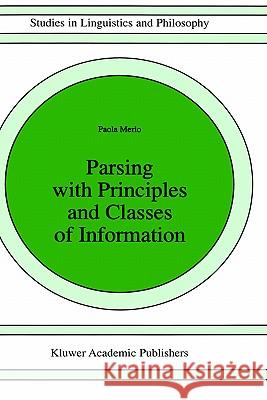Parsing with Principles and Classes of Information » książka
Parsing with Principles and Classes of Information
ISBN-13: 9780792341031 / Angielski / Twarda / 1996 / 246 str.
Parsing with Principles and Classes of Information presents a parser based on current principle-based linguistic theories for English. It argues that differences in the kind of information being computed, whether lexical, structural or syntactic, play a crucial role in the mapping from grammatical theory to parsing algorithms.
The direct encoding of homogeneous classes of information has computational and cognitive advantages, which are discussed in detail. Phrase structure is built by using a fast algorithm and compact reference tables. A quantified comparison of different compilation methods shows that lexical and structural information are most compactly represented by separate tables. This finding is reconciled to evidence on the resolution of lexical ambiguity, as an approach to the modularization of information.
The same design is applied to the efficient computation of long- distance dependencies. Incremental parsing using bottom-up tabular algorithms is discussed in detail.
Finally, locality restrictions are calculated by a parametric algorithm.
Students of linguistics, parsing and psycholinguistics will find this book a useful resource on issues related to the implementation of current linguistic theories, using computational and cognitive plausible algorithms.











